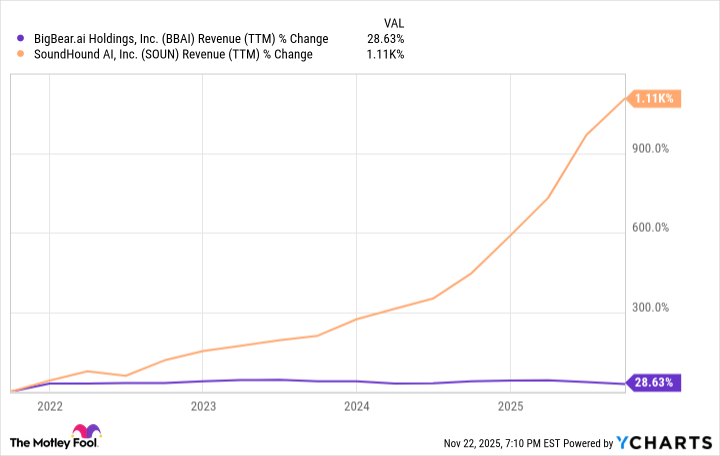Organizations around the world are rushing to adopt artificial intelligence (AI) technologies and apply them to a range of uses. This led to the emergence of companies focused on specific niches in the space. Some, such as BigBear.ai (BBAI 8.70%), are geared toward meeting the needs of government clients. Others, for example, SoundHound AI (SOUN 6.83%), target the demands of consumer-facing companies.
BigBear.ai's tech focuses on bringing AI to bear on national security applications, including using it to sift through facial recognition data from airports and identify potential threats among travelers. SoundHound applies AI to interpret human speech for commercial purposes, such as taking food orders at restaurant drive-thrus or over the phone.
As artificial intelligence adoption ramps up, which of these AI-powered businesses is better positioned to be a rewarding investment?

Image source: Getty Images.
A look at BigBear.ai's business
BigBear.ai's tech has been adopted by numerous airports, including Chicago O'Hare. Other customers included the U.S. Army and Navy.
However, its sales growth lately has been dismal for an AI tech business. In 2024, revenue rose 2% to $158.2 million. The company brought in a new CEO at the start of 2025 -- Kevin McAleenan, who served as acting secretary of the Department of Homeland Security during President Donald Trump's first term. But despite that, BigBear.ai's business was hit this year by spending cuts implemented by the Trump administration.
The majority of BigBear.ai's revenue comes from the U.S. government. Cuts to those contracts caused its sales to drop to $100.4 million through the first three quarters of 2025, compared to $114.4 million in the prior-year period. That revenue decline coincided with an increase in operating expenses, resulting in the company booking a total operating loss of $133.4 million through the first three quarters of 2025, compared to a loss of $125.3 million in the prior-year period.
BigBear.ai is taking steps to grow its business. In Q3, it announced the impending acquisition of Ask Sage, which provides agentic AI to 160,000 government teams. Ask Sage is forecast to hit annual recurring revenue of $25 million in 2025, a sixfold increase over 2024, and should boost BigBear.ai's sales in 2026.

NYSE: BBAI
Key Data Points
SoundHound AI's pros and cons
SoundHound's tech has been adopted by businesses across the automotive, restaurant, and financial services industries, among others. Major customers include Red Lobster and Chipotle Mexican Grill.
Like BigBear.ai, SoundHound turned to acquisitions to grow its business. Those buys contributed to its revenue of $113.9 million through the first three quarters of 2025, which more than doubled the $50.2 million it brought in during the first three quarters of 2024. In light of its strong sales growth, management has raised its full-year revenue forecast to a range of $165 million to $180 million.
However, those acquisitions also increased operating costs, leading to a Q3 operating loss of $115.9 million compared to a loss of $33.8 million in the prior-year period. SoundHound is working to cut expenses across its acquired businesses, and expects to see results from those efforts in 2026.
In addition, the company predicts it can achieve adjusted EBITDA profitability in the near future, perhaps as soon as the end of 2025. Its success on that score will depend on whether the company hits the high end of its full-year sales forecast. SoundHound had an adjusted EBITDA loss of $14.5 million in Q3.

NASDAQ: SOUN
Key Data Points
Choosing to invest in BigBear.ai or SoundHound AI
Given that neither of these AI businesses is profitable yet, one reasonable way to gauge them as potential investments is to weigh their revenue growth. One of the alluring features of tech companies for investors is that they can deliver fast-rising sales. When a company can show such an arc on the top line, it demonstrates there's a market for its product. Moreover, it's common for younger tech businesses to pour money into expansion, foregoing profits in the short term to capture as large a share of their target market as possible.
SoundHound fits this profile, as its revenue has risen significantly over the past several years. BigBear.ai has not been as successful.
Data by YCharts.
In addition, SoundHound's business possesses more diversified income streams. No single industry contributes more than 25% of its sales. Meanwhile, BigBear.ai's reliance on the federal government means its success hinges on a single, large customer.
Moreover, BigBear.ai's tepid sales growth even before Trump began cutting spending suggests that its potential customers aren't finding its offerings as compelling as those of its rivals. Perhaps the acquisition of Ask Sage will make a difference, but the prudent approach would be to hold off buying shares of BigBear.ai until the company's performance improves.
As a result, between these two, SoundHound is the superior AI stock to invest in at this time. That said, its valuation is on the expensive side. Its price-to-sales (P/S) ratio of 30 is far higher than BigBear.ai's 12. With that in mind, even though it's a better bet than BigBear.ai, I'd suggest the wisest approach would be to wait for SoundHound stock to drop to a less lofty valuation before buying it.






